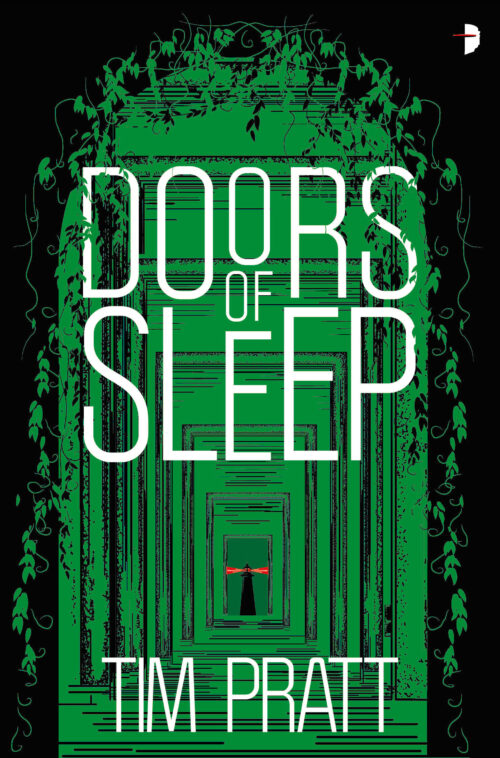
Tim Pratt is joining us today to talk about his novel, Doors of Sleep. Here’s the publisher’s description:
What would you do if you woke up and found yourself in a parallel universe under an alien sky? This is the question Zax Delatree must answer every time he closes his eyes.
Every time Zax Delatree falls asleep, he travels to a new reality. He has no control over his destination and never knows what he will see when he opens his eyes. Sometimes he wakes up in technological utopias, and other times in the bombed-out ruins of collapsed civilizations. All he has to live by are his wits and the small aides he has picked up along the way – technological advantages from techno-utopias, sedatives to escape dangerous worlds, and stimulants to extend his stay in pleasant ones.
Thankfully, Zax isn’t always alone. He can take people with him, if they’re unconscious in his arms when he falls asleep. But someone unwelcome is on his tail, and they are after something that Zax cannot spare – the blood running through his veins, the power to travel through worlds…
What’s Tim’s favorite bit?

TIM PRATT
I love playing with point-of-view. The first literary experiments I remember doing as a young writer (and I’m talking, like, as a fourth grader) involved writing unreliable narrators, usually with some SHOCKING TWIST at the end. I love the subjective nature of viewpoint characters, and how two different people will see the same setting or situation and have totally different impressions, based on their own internal landscapes. There’s a common writing exercise where you write the same view of a lake as seen by a young boy and an old woman, or someone who just fell in love and someone who just had their heart broken, and that is always in the back of my mind. If I have a character who’s a genetic engineer, they’re going to look at the world differently than an art historian or an architect would–they’ll use different metaphors and engage with the world differently on a basic psychological and perceptual level.
My novel Doors of Sleep is told in the form of journal entries written by the main character, Zax, to chronicle his peculiar adventures. He has a weird condition: whenever he falls asleep, he wakes up in a different branch of reality. He never knows if he’ll open his eyes in a technological utopia, a savage wilderness, an alien city, a derelict space station, or any point in between (or well beyond). He starts the journal as a simple log of the worlds he’s visited, in an attempt to discern some pattern in his travels, but it gradually expands into a diary that provides a narrative. That gives me lots of opportunities for unreliable narration and to build character–Zax is trained as a harmonizer, a sort of social worker, and he always tries to do good and help people when he can, though he never knows if he makes a lasting difference. That affects the way he sees the world and tells his story.
But, opportunities for unreliable narration aside, the diary format can be somewhat limiting. My favorite part of the novel are the bits where I figured out ways around that limitation. There’s a section of the book where Zax can’t write his own entries for
, and one of his companions, a crystal intellect named Vicki, picks up the account, so we get several entries that provide a different view of Zax and the whole situation. (Oh, yeah: Zax can take people with him, if they fall asleep in his arms… though they tend to get lost, or choose to stay behind when they find a world they like enough.) There’s even a section where the antagonist, an ambitious jerk named the Magister who pursues Zax through the multiverse, gets his hands on the journal and scribbles a few lines of his own.The best part in terms of point-of-view shenanigans, though, involves Zax’s companion Minna. She’s from a world with advanced agricultural biotech, but she doesn’t really write or read, so she never contributes to the diary directly. Instead, when she needs to tell Zax about some difficult experiences she had, she creates a “seed” that contains her experiential memories. Zax eats the seed, and goes into a sort of dream-state where he relives Minna’s memories as if they’re happening in real-time, as a sort of passenger in her mind. Then he writes about what he saw in his diary…. which means I got to write about Minna’s adventures, in the first person, but with her story filtered through Zax’s perceptions, as the ghost in the back of her mind. I’d never written a viewpoint quite like that before, and after thirty-some novels, that’s kind of a rare experience.
Will readers even notice what I did with those nested perceptions? Maybe not, but it was a lot of fun for me, and I think the layering makes both characters richer, and their relationship more powerful.
LINKS:
Doors of Sleep Universal Book Link
BIO:
Tim Pratt is a Hugo Award-winning SF and fantasy author, and has been a finalist for World Fantasy, Sturgeon, Stoker, Mythopoeic, and Nebula Awards, among others. He is the author of over twenty novels, most recently The Deep Woods and Heirs of Grace, and scores of short stories. His work has been reprinted in The Best American Short Stories, The Year’s Best Fantasy, The Mammoth Book of Best New Horror, and other nice places. Since 2001 he has worked for Locus, the magazine of the science fiction and fantasy field, where he currently serves as senior editor. He lives in Berkeley, CA with his wife and son.
